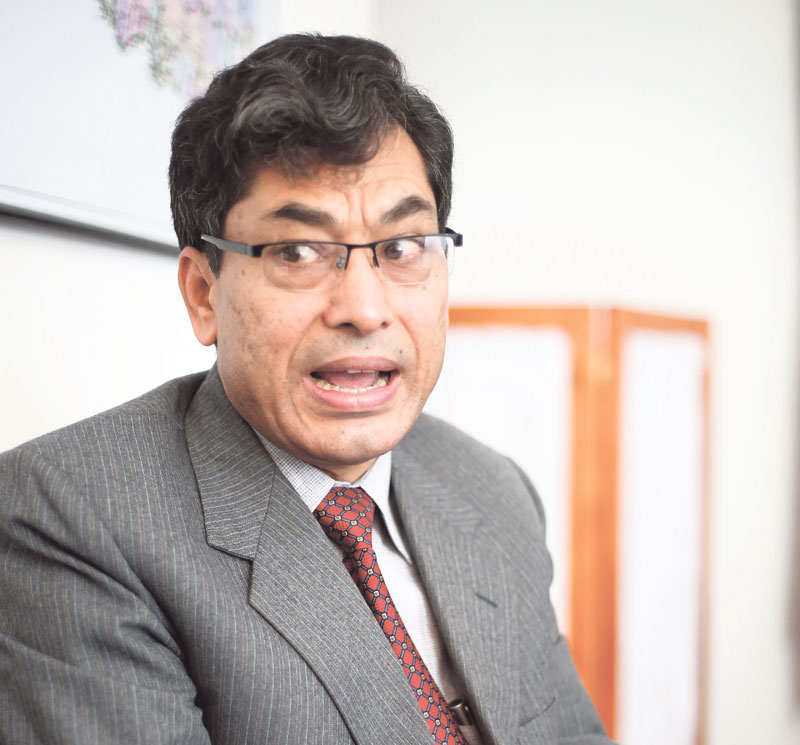
OR
There is an environment to justify supplementary budget
Published On: November 14, 2016 12:10 AM NPT By: Republica | @RepublicaNepal

The National Planning Commission (NPC) is the apex advisory body of the government for formulating a national vision, periodic plans and policies for development. It serves as a central agency for monitoring and evaluating development plans, policies and programs. Despite the NPC taking a lead role in the formulation of planning as well as monitoring of development projects, the implementation aspect has remained weak as reflected in the failure to boost capital expenditure. Sagar Ghimire and Laxman Biyogi of Republica talked with Min Bahadur Shrestha, the vice chairman of the NPC, on the problems in project planning and implementation as well as the government plan to bring supplementary budget. Excerpts:
Though it has been many years since the planned development process began in Nepal, the achievement does not seem satisfactory. Many point out flaws in the planning process for the failure in development. What is the reality?
We cannot say that the planning was 100 percent right. But I don't think that the result could not be achieved just due to flaws in the planning process. It is said that a project's success depends 10 percent on planning and remaining 90 percent on its implementation. The problem now is on 90 percent, not in the 10 percent. It might be that the implementation mechanism was overlooked while making plans or it was done differently which resulted into underperformance. The delivery mechanism was either not evaluated properly in the planning process or the competency of such mechanism eventually became weak or eroded. Bureaucracy and private sector are in the delivery system. There have been many problems in the delivery system in recent time. Our bureaucracy lacks competency. There is not energy among government staffers. On the other hand, non-governmental organizations (NGOs) have got roles across the country.
Most of the resources, which are supposed to be delivered to the grassroots level, are sucked by their channel. The private sector is no different. So the problem is in the delivery system. The malaise in the delivery system is the reflection of the political instability of the country. The delivery system needs to be restructured. This should begin with political lead, political will and political stability.
You pointed out delivery system for the failure of projects. But many projects are chosen based on political pressure without doing any feasibility study as such. Isn't it a bad practice?
This is partially true. Though there was political instability in the past decade, there was not any major change in the projects that we have prioritized. National pride projects, airport projects and hydropower projects that we have pursued were not brought haphazardly or under political pressure. They are carried out based on the study on requirement of the country, importance and economic development. The problem is about the failure on implementation or its delay. Every year while preparing budget, political leaders come to us to include their projects like roads, drinking water and other local infrastructures. It is not a problem as we cannot go to the local level to find out projects on our own capacity. They are selected by the political parties, local bodies and national mechanism. NPC selects projects based on their suggestions. However, there are problems sometime when implementing those plans due to land acquisition, forest clearance and other issues.
The progress of many national pride projects is pathetic. Also the government has not been able to increase capital spending. Where do you see the problem?
We have identified some problems. There is a council in the NPC led by the Prime Minister to resolve these problems. The reasons behind the failure to meet the spending target in the past and at present are different. Earlier, the government could not table its budget in time. It would affect the project approval process. This time, the budget was introduced in May and we started giving approvals from-mid August itself. The NPC has already given approval for 90 percent of the projects. It was said that there was problem in Public Procurement Act and bylaws. We have already amended the act to simplify the procurement process. There were complaints that the Commission for the Investigation of Abuse of Authority (CIAA) has scared people from working. Many, who are lazy and do not want to take risk, has also find it convenient to blame the CIAA. There has been new development and changes in the leadership of the CIAA which will work in the positive direction. We are also urging the CIAA and National Vigilance Center to include the failure of completing the required works by using the authority in the definition of abuse of authority. This does not imply that the execution will be handed over to the CIAA, but they should also play role in encouraging development works. Performance contract and evaluation of project chiefs and secretaries of line ministry will also expedite the projects.
There is a mechanism in the NPC for monitoring of development projects. But many say that the mechanism is lying dormant.
Evaluation and monitoring are major components of the development process. There are other agencies for monitoring and evaluation of projects at various stages. Also, there is monitoring and evaluation division at the NPC. We have a different format for monitoring and evaluation. This division has the lowest budget which, I think, should be reversed. The commission is giving emphasis on allocating more budgets on evaluation and monitoring.
Similarly, there is a separate taskforce under the leadership of NPC vice chairman. This taskforce holds review meeting about the progress on projects, problems and solution for those problems every month. I agree that we are giving less priority to monitoring and evaluation. We will improve it.
NPC vice chairman and members are changed with the change in government. Don't you think that the change of leadership is reflected in overall planning and development process?
The NPC also faces the same impact that the country faces due to frequent changes of the government. But, this does not mean that everything gets spoiled. Programs and planning are formulated to maintain stability even when there is political instability and change in leadership. Since concerns and suggestions of all political parties are reflected in the planning, it does not make any fundamental changes when there is change in the leadership. The plans and projects initiated by the former Prime Minister Sushil Koirala, were continued by the KP Oli-led government and being continued by the incumbent government.
Talks of supplementary budget are doing rounds. Why did the NPC feel the need of supplementary budget?
The NPC has showed the government that there is an environment to justify the supplementary budget. It is up to the government to decide whether or not to bring supplementary budget after holding consultations with coalition partners and opposition parties. There is justification for the supplementary budget from the surplus of the fund from the last fiscal year. It was estimated that there would be surplus fund of Rs 59 billion that can be used forward from the last fiscal year. But we have now additional Rs 68 billion fund surplus from the last fiscal year. We can bring supplementary budget to spend that money. Also, there is room for more revenue collection as the revenue collection was higher than the target last year. On the one hand we are saying that we will provide Rs 200,000 to earthquake survivors, which we know is not adequate to build their homes, while we have resource surplus on the other hand. With this notion, we said that we can spend more than Rs 100 billion which can justify the supplementary budget.
You May Like This

Meryl Streep is not an ‘overrated actor’ Donald Trump, she is the most decorated
President-elect Donald Trump took to Twitter on Monday, calling Meryl Streep “one of the most over-rated actresses in Hollywood” following... Read More...

'There is no good or bad cinema'
MUMBAI, Oct 24: With films such as 'Munna Bhai MBBS', 'Lage Raho Munnabhai', '3 Idiots' and 'PK' to his credit, Rajkumar... Read More...

There is no opposition in Nepal
Political Scientist and co-author of books Political Leadership in Nepal and Local Leadership in Nepal, Hari Sharma, believes there are... Read More...



Just In
- World Malaria Day: Foreign returnees more susceptible to the vector-borne disease
- MoEST seeks EC’s help in identifying teachers linked to political parties
- 70 community and national forests affected by fire in Parbat till Wednesday
- NEPSE loses 3.24 points, while daily turnover inclines to Rs 2.36 billion
- Pak Embassy awards scholarships to 180 Nepali students
- President Paudel approves mobilization of army personnel for by-elections security
- Bhajang and Ilam by-elections: 69 polling stations classified as ‘highly sensitive’
- Karnali CM Kandel secures vote of confidence















Leave A Comment